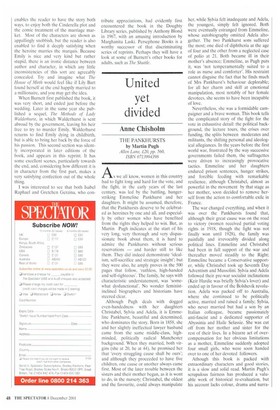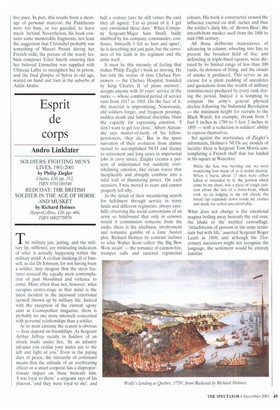United yet divided
Anne Chisholm
THE PANKHURSTS by Martin Pugh Allen Lane, £20, pp. 560,
ISBN 0713994398
As we all know, women in this country had to fight long and hard for the vote, and the fight, in the early years of the last century, was led by the battling, hungerstriking Emmeline Pankhurst and her daughters. It might be assumed, therefore, that the Pankhursts deserve to be celebrated as heroines by one and all, and especially by other women who have benefited from the rights they helped to win. But, as Martin Pugh indicates at the start of his very long, very thorough and very dispassionate book about them, it is hard to admire the Pankhursts without serious reservations — and harder still to like them. They did indeed demonstrate 'idealism, self-sacrifice and strategic insight'; but they were also, he amply proves in the 500 pages that follow, 'ruthless, high-handed and self-righteous'. The family, he says with characteristic understatement, was 'somewhat dysfunctional'. No wonder feministinclined biographers and historians have steered clear.
Although Pugh deals with dogged even-handedness with her daughters Christabel, Sylvia and Adela, it is Emmeline Pankhurst, beautiful and determined, who dominates the story. Born in 1858, she and her slightly ineffectual lawyer husband came from the same middle-class, highminded, politically radical Manchester background. When they married, both virgins (she at 20, he at 44), he promised her that 'every struggling cause shall be ours'; and although they proceeded to have five children, one cause or another always came first. Most of the later trouble between the sisters and their mother began, as it is wont to do, in the nursery; Christabel, the oldest and the favourite, could always manipulate her, while Sylvia felt inadequate and Adela, the youngest, simply felt ignored. Both were eventually estranged from Emmeline, whose autobiography omitted Adela altogether. The two Pankhurst sons suffered the most; one died of diphtheria at the age of four and the other from a neglected case of polio at 21. Both became ill in their mother's absence; Emmeline, as Pugh puts it, was 'not temperamentally suited to a role as nurse and comforter'. His restraint cannot disguise the fact that he finds much of Mrs Pankhurst's behaviour deplorable; for all her charm and skill at emotional manipulation, most notably of her female devotees, she seems to have been incapable of love.
Nevertheless, she was a formidable campaigner and a brave woman. This book tells the complicated story of the fight for the vote in exhaustive detail: the political background, the lecture tours, the crises over funding, the splits between moderates and militants, the shifting personal and ideological allegiances. In the years before the first world war, frustrated by the way successive governments failed them, the suffragettes were driven to increasingly provocative tactics. Emmeline and her daughters endured prison sentences, hunger strikes, and forcible feeding with remarkable resilience, although Christabel, almost as powerful in the movement by that stage as her mother, soon decided to remove herself from the action to comfortable exile in France.
The war changed everything, and when it was over the Pankhursts found that, although their great cause was on the road to victory (women received partial voting rights in 1918, though the fight was not finally won until 1928), the family was painfully and irrevocably divided along political lines. Emmeline and Christabel had been in full support of the war and thereafter moved steadily to the Right; Emmeline became a Conservative supporter, while Christabel took up Seventh Day Adventism and Mussolini. Sylvia and Adela followed their pre-war socialist inclinations (Keir Hardie was briefly Sylvia's lover) and ended up in favour of the Bolshevik revolution. Adela was packed off to Australia, where she continued to be politically active, married and raised a family; Sylvia, who never married but had a son by an Italian colleague, became passionately anti-fascist and a dedicated supporter of Abyssinia and Haile Selassie. She was cut off from her mother and sister for the rest of their lives. In a bizarre act of overcompensation for her obvious limitations as a mother, Emmeline suddenly adopted four small girls, who were soon handed over to one of her devoted followers.
Athough this book is packed with extraordinary characters and good stories, it is a slow and solid read. Martin Pugh's scrupulous fairness has produced a valuable work of historical re-evaluation, but his account lacks colour, drama and narra tive pace. In part, this results from a shortage of personal material; the Pankhursts were too busy, or too guarded, to leave much behind. Nevertheless, his book contains some memorable fragments, not least the suggestion that Christabel probably saw something of Marcel Proust during her French exile, the picture of the sturdy lesbian composer Ethel Smyth ensuring that her beloved Emmeline was supplied with Château Lafite to strengthen her in prison, and the final glimpse of Sylvia in old age, waited on hand and foot in the suburbs of Addis Ababa.























































































 Previous page
Previous page